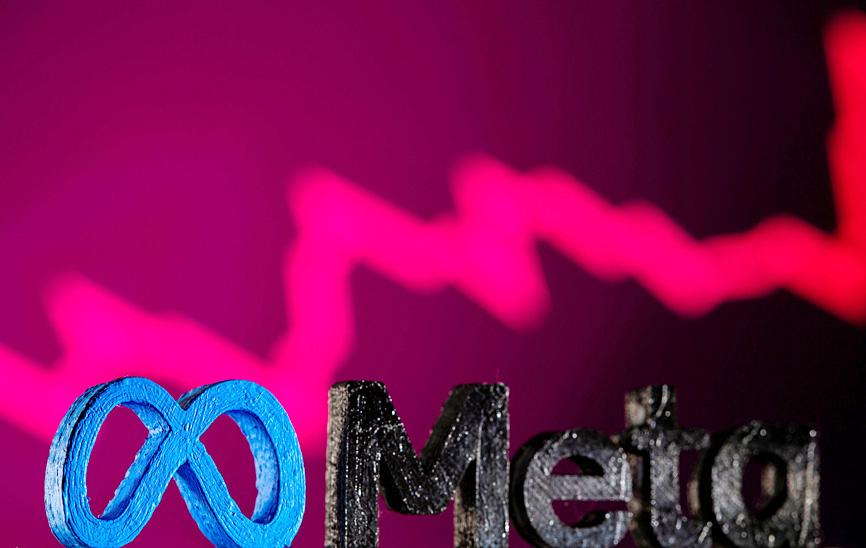Facebook’s parent firm on Thursday opened its Horizon Worlds virtual-reality (VR) platform to the public in North America, in a step toward building its metaverse vision for the future.
Horizon Worlds is far from a fully realized metaverse, a future Internet where online experiences like chatting to a friend would eventually feel face-to-face thanks to VR headsets.
However, headset-wearing users in the US and Canada can now gather with friends or others, play games and build their own virtual worlds on Horizon as long as they are 18 years old and have the proper equipment.

Photo: Reuters
Since last year, a testing version of the platform has been available to a limited number of users.
Facebook renamed its parent company to Meta in October to emphasize its aim to shift from scandal-prone social media platform to its virtual reality vision for its future.
“We want Horizon Worlds to be a safe and respectful environment, so everyone must follow our conduct in VR policy,” Meta said in announcing the opening.
“You have several safety options ... which lets you take a break and then block, mute or report people,” it added.
Meta-owned platforms Facebook and Instagram have been fighting to put behind them a crisis unleashed in September by reams of internal studies leaked to journalists and US authorities by whistleblower Frances Haugen.
The documents underpinned damaging articles that generally argued the firm knew its products could harm users, but chose growth over safety.
The firm’s metaverse push also includes tools for remote working, which has boomed during the COVID-19 pandemic.
Facebook in August unveiled technology for “workrooms,” allowing remote collaboration for people using its Oculus VR gear.
The “Horizon Workrooms” project makes it possible to switch back and forth from virtual reality to Web conferencing to adapt to different situations.

Sweeping policy changes under US Secretary of Health and Human Services Robert F. Kennedy Jr are having a chilling effect on vaccine makers as anti-vaccine rhetoric has turned into concrete changes in inoculation schedules and recommendations, investors and executives said. The administration of US President Donald Trump has in the past year upended vaccine recommendations, with the country last month ending its longstanding guidance that all children receive inoculations against flu, hepatitis A and other diseases. The unprecedented changes have led to diminished vaccine usage, hurt the investment case for some biotechs, and created a drag that would likely dent revenues and

Global semiconductor stocks advanced yesterday, as comments by Nvidia Corp chief executive officer Jensen Huang (黃仁勳) at Davos, Switzerland, helped reinforce investor enthusiasm for artificial intelligence (AI). Samsung Electronics Co gained as much as 5 percent to an all-time high, helping drive South Korea’s benchmark KOSPI above 5,000 for the first time. That came after the Philadelphia Semiconductor Index rose more than 3 percent to a fresh record on Wednesday, with a boost from Nvidia. The gains came amid broad risk-on trade after US President Donald Trump withdrew his threat of tariffs on some European nations over backing for Greenland. Huang further

Macronix International Co (旺宏), the world’s biggest NOR flash memory supplier, yesterday said it would spend NT$22 billion (US$699.1 million) on capacity expansion this year to increase its production of mid-to-low-density memory chips as the world’s major memorychip suppliers are phasing out the market. The company said its planned capital expenditures are about 11 times higher than the NT$1.8 billion it spent on new facilities and equipment last year. A majority of this year’s outlay would be allocated to step up capacity of multi-level cell (MLC) NAND flash memory chips, which are used in embedded multimedia cards (eMMC), a managed

CULPRITS: Factors that affected the slip included falling global crude oil prices, wait-and-see consumer attitudes due to US tariffs and a different Lunar New Year holiday schedule Taiwan’s retail sales ended a nine-year growth streak last year, slipping 0.2 percent from a year earlier as uncertainty over US tariff policies affected demand for durable goods, data released on Friday by the Ministry of Economic Affairs showed. Last year’s retail sales totaled NT$4.84 trillion (US$153.27 billion), down about NT$9.5 billion, or 0.2 percent, from 2024. Despite the decline, the figure was still the second-highest annual sales total on record. Ministry statistics department deputy head Chen Yu-fang (陳玉芳) said sales of cars, motorcycles and related products, which accounted for 17.4 percent of total retail rales last year, fell NT$68.1 billion, or